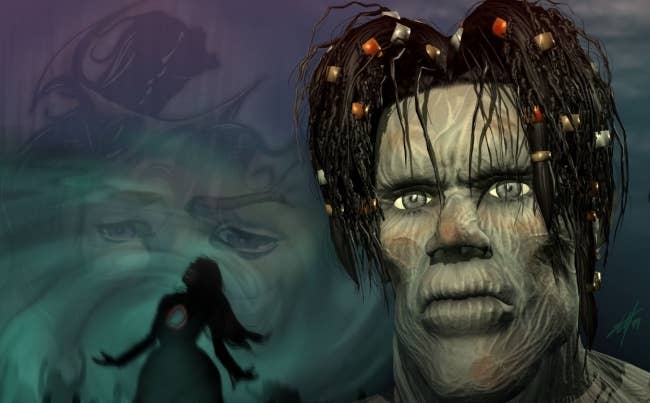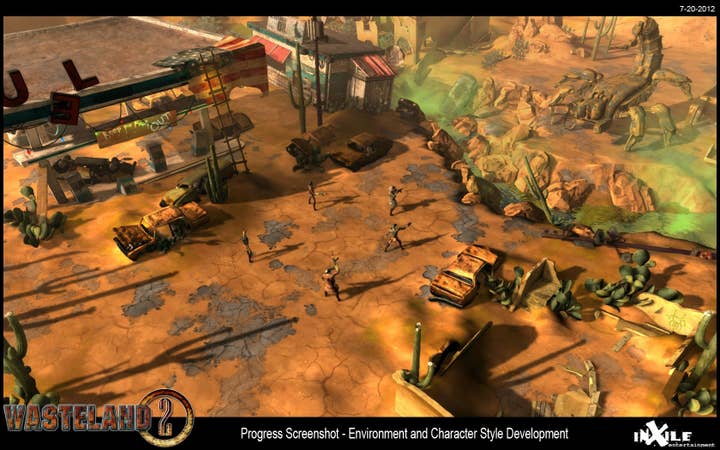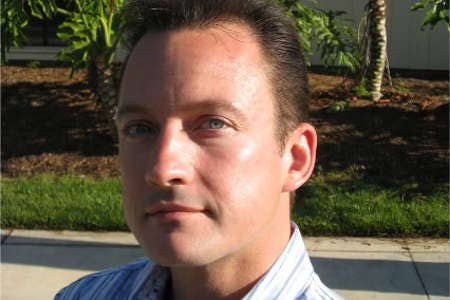Return to the Wasteland: Obsidian's Chris Avellone
The writer and designer on Kickstarter, Wasteland, South Park and why he's tempted to reboot Planescape
It's nice to know that people in the industry still have their heroes, that there are veteran designers unaffected by the cynicism of over-exposure, developers who still have their own inner-fanboy.
Speaking to Obsidian's Chris Avellone, it soon becomes clear that he's one of the lucky ones in this respect. He talks with passion and clear relish when speaking on games in general, but he's clearly over the moon to be working on the sequel to a game which he "played all night during high school", Wasteland.
Brian Fargo had been putting the idea of Wasteland 2 to publishers for years, says Avellone during his talk at Barcelona's Gamelab. They didn't see the demand. Luckily, over 61,000 people did, backing a kickstarter which soared past its $900,000 goal to over $2 million.
Here, GameIndustry International speaks to Chris about his work on Wasteland, Kickstarter, what's happening at Obsidian and why we may yet see a Planescape reboot.
Well it started because Brian knew I was a big Wasteland fan. He asked for a quote for the website and then we talked about Wasteland and I told him I was a really big fan and I'd love to see a sequel. Then a week later Brian asked if I'd want to work on it and I said, yes I would. Then he asked if Obsidian might want to team up on it so we came to an arrangement there.
"He's paying Obsidian for my time, even though I'd do it for free"
Avellone on Fargo and Wasteland
He wanted to look at some of our toolsets to see if any of our technology would be a good fit, things like the conversation editor, any other tools that might work better than Unity. Unity actually ended up being a better fit.
Anyway, it came down to me being the guy from Obsidian working on it and he's paying Obsidian for my time, even though I'd do it for free.
I don't know - that'd be a conversation for my boss and Brian. I think Brian is a big enough guy that if things turned out really well for Wasteland 2 then Obsidian would get some sort of compensation. But that's not contractually set in stone, that's more a gentleman's discussion to have later.
Well, I totally agree with you, I think that there's a danger of nobody, or a small percentage of people buying it once it's funded. But at the same time the advantage comes from the fact that you've developed a project with funding, you've hit the goals that the players want, they enjoy the product - chances are that you can do it again, with Wasteland 3 or whatever.
The reward if people do respond to it after a kickstarter, and you sell shitloads and people really find it fun, suddenly things change in a different way - suddenly you don't need kickstarter to sort the next project but you've proven the idea is viable and that people will pay for it, and not just the original backers. It becomes more validating.

I think there's always that danger, it's already there to begin with. What has changed is that you get a lot more input about what people want to see, you can talk frankly about it. That makes you more likely to hit the end goal I think.
I think publishers are basically rolling the dice a bit when they start projects, they develop them in a vacuum for a year or so before they can say anything to the public, before any direction is shared. They don't know if it's going to be profitable or popular so I think that's why they often play it safe with the sequels and the franchises etc.
With a Kickstarter you get that input early and you know how exciting people find your project, you've got that acid test.
Yep, but at least you get closure. You can say, "my idea wasn't good enough, it didn't resonate enough and now I don't have an illusion of a dream".
Ideally you can then use that as a learning experience and ask "what didn't people respond to? Why did they think it sucked?" I think I prefer knowing that sort of thing up front.
"Everyone's in a very collaborative mood - we just bounce ideas off each other, there's not much 'we don't like this'"
That's pretty much how it's panned out so far. It's been pretty free-form with the story design, the area division, the flow of the adventure. Everyone's in a very collaborative mood - we just bounce ideas off each other, there's not much "we don't like this."
Brian knows Wasteland better than anybody, so I do defer to him on direction and feel of things if there ever is any doubt - he knows the product better than I do. I'm a huge fan and I enjoy designing for it, but at the end of the day it's Brian's original vision for Wasteland that made it so well received so I listen.
Yeah, and a lot of the guys are playing it again and charting their experiences, writing walkthroughs and everything. I played the whole game through again as soon as I knew I was getting involved with the project and it's still just as much fun as it was in high school. I was pretty surprised because I thought it might suffer from Last Starfighter syndrome, where I thought it was amazing as a kid then watched it again and thought, "maybe I didn't know what I was talking about!"
I actually discovered that Fallout was much more limiting than working on Wasteland, for a number of reasons. One is that the production pipeline is much more limiting now, in terms of what you can do, the second is that Fallout comes with a number of genre limitations. It's very important, for example to maintain that '50s sci-fi vibe. You can't lose that or you lose Fallout. In Wasteland, that's one of the parameters that's removed, you can do a fun post-apocalyptic game and have a lot more freedom with what you want to do. Wasteland 1 was full of crazy, fun stuff to do. I don't know if you can do that in Fallout and get away with it.
I think that there a few already. I think Dead State is original, as is Republique...
"The publisher model will always be there, Kickstarter will always be a better fit for indie and concept games. Kickstarter won't be the silver bullet that changes everything."
Yeah, I can't argue with the fact that bringing a big name to a Kickstarter will give it a huge financial boost, but I do think that there have been new IPs on Kickstarter. It's an uphill battle if they don't have a big name or concept behind them, though.
I don't think so - there'll always be room for publishers and AAA titles, no matter what. People will always want those summer blockbusters and big production value games. I think the publisher model will always be there, Kickstarter will always be a better fit for indie and concept games. Kickstarter won't be the silver bullet that changes everything.
Sure. I think people already are getting tired of hearing about it. People are also running out of money for it - it had a contagious energy once Double Fine started doing it which caught hold of everybody because it was brand new and it was an exciting thing to get involved with. It had the appeal of being something special, something to get involved with that no-one else will.
I think that all contributed to this huge emotional wave with Double Fine, but that's been going down as it becomes more standardised and it's harder to get excited by new appeals as the exhaustion sets in.

I'm not sure it's taking advantage... but I do think it's a good question to ask. It's only going to take that one game that doesn't deliver to change the model. At that point, the problem with the system will set in and I think things will change. Right now I think it's more in favour of developers, you're right - there's a lot of freedoms associated with it.
That said, I went through all the named backers for Wasteland 2 - most of them wanted a character or an item named after them. Going through those names was actually pretty exciting - and I'll be honest I thought it would be a chore. Once people have shelled out, then they're immortalised in a game as a character or a badass weapon, I think that there's a real value to that.
In Fallout 2, when I put people I know's names on gravestones outside New Reno, they still get people asking about it - I think it's hard to put a cash value on that, getting the community having their stamp on the game.
It's been a lot of fun. We weren't sure what South Park meant when they said that they wanted a role-playing game, but then they showed us a two-minute animatic which illustrated how the gameplay would work and then we got it. But we still weren't sure how to take our engine and make an episode of the show that you can interact with - but it turns out that we were able to take our Dungeon Siege 3 engine and turn it into a 2D version to keep the feel of the show. Once we had that sorted, there really wasn't much else to do apart from develop a load of really fun spells.
The amount of involvement that Matt and Trey have had with the storyline and the character involvement, how they behave in combat and things like the summons, has been really gratifying - they're definitely on-board with the game. I get the feeling that they've put the same sort of passion into the game that they did into something like the Book of Mormon. The design meetings have been pretty fun too. [laughs]
I think that's the realm of THQ and South Park - we just suggest the stuff that we think is funny! As long as it's mockery and comedy there's a lot you can get away with.
I don't know if it's typical for us. First off the area design is very different to what we're used to - we're much more used to a 3D open-world. Also, designing with an episode of South Park in mind, interacting with houses for collectibles and things like that, that's a different design methodology.
I think if you made a game using some of the concepts of Planescape, the metaphysical ideas and the plane travel, without using the D&D mechanics, you could actually come up with a much better game.
Stuff like spells and improvement trees, that's all stuff we've done before - so it's a mix of old and new, which makes it exciting.
Yes! Very tempted.
Yeah - I think the challenges we've spoken about would all have to be considered and to be honest I don't know if I'd want to do it as a Planescape game - I think a better approach would be to ignore the D&D mechanics and respect what Planescape was trying to do and what the game did and see if you can do what Fallout did when it became the spiritual successor to Wasteland.
I think if you made a game using some of the concepts of Planescape, the metaphysical ideas and the plane travel, without using the D&D mechanics, you could actually come up with a much better game. With Torment, I'd argue that the D&D base actually, in places, got in the way of the experience. It was a lot harder to make a game with those ideas in it with D&D mechanics. So much that we had to break a lot of them. We had to ignore certain spells, change up the class mechanic so that you can switch at any time you like by remembering abilities.
That was stuff that D&D didn't allow for, it was to restraining in some respects. If we did do a spiritual successor, then I don't know if we'd use the Planescape licence or attach the mechanics, perhaps something that has a different feel to Torment.

